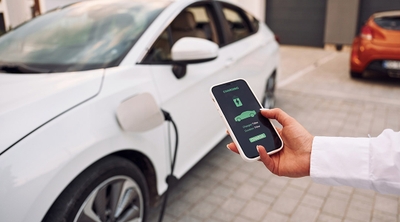How long does an electric car battery last?
6 min read
You can expect electric car batteries to last at least ten years or 100,000 miles, according to U.S. News. The National Renewable Energy Laboratory (NREL) estimates that today's EV batteries may last 8–12 years in extreme climates and 12–15 years in moderate climates, which means they could outlive the cars they're installed in. In comparison, standard car batteries last three to five years on average. This time frame may vary based on the type of battery your car uses and how you maintain your car battery to keep it from dying.
We talked to a couple experts to get their take on how long batteries last in electric cars. Mark Cann is the founder and CEO of CryomatiKs, a clean tech company based in Florida, and Dan Wilson is the director of energy services with EV company Inspiration Mobility.
What's an EV battery?
An electric vehicle battery is a rechargeable lithium-ion energy storage system. You plug an EV battery into a charging station to replenish the electric energy, which powers the vehicle. EVs also have regenerative braking, which generates electric power while it slows the vehicle to a stop. For a conventional car, the majority of its energy comes from the gas tank. Cann explains that standard vehicles have 12-volt batteries that are based on lead-acid chemistry. Learn more about the difference between hybrid vs. electric vehicles.
How to know it's time to replace your electric car's battery
One of the telltale signs that your EV battery is on its way out is a reduction in your driving range. An electric vehicle typically has a range of 200 to 350 miles after a full charge, depending on the make and model of your vehicle. If the car's performance drops below 80% of its original range, Wilson recommends taking it to a service center for maintenance. If your car is still within its warranty window, you may be able to get a replacement battery for free, depending on the terms of your contract.
How can you tell when it's time to replace a cell or the full battery
When you notice that your EV battery's capacity has degraded below 75-80%, and it has exceeded its warranty, you can bring it to a mechanic, who will tell you whether they can repair the battery by replacing defective cells or replace the entire battery. EV Friendly recommends consulting your battery's state of health (SOH) report, which your EV mechanic can run, to determine its condition and how much longer you can expect it to last before it will need to be replaced.
Note that when looking at your battery's range and whether it has deteriorated, Cann says you should consider the impact that weather has on your EV's range. A reduced range is normal during extremely hot or cold days.
AAA reports that cold weather (20 degrees Fahrenheit) can reduce range by about 12% when compared to the same conditions with milder temperatures. AAA also found that EV range dropped by 17% at 95 degrees Fahrenheit, when the vehicle's cabin was using air conditioning.
Here.com reports that high winds can also affect your EV's range. Driving into headwinds forces the batteries to work harder reducing the range by approximately 15%. But if you still notice a reduction in the battery's performance when the weather is mild, consider having it looked at by a professional.
How often should electric car batteries be replaced?
Ideally, you should never need to replace your EV's entire battery pack. The newest electric car battery life has an increasingly longer range than the ones preceding them, so the average electric vehicle owner rarely needs to replace the entire battery as its range degrades. You would instead replace individual battery cells as they die.
How much does it cost to replace a battery in an electric car?
Consumer Reports estimates that if an EV battery pack needed to be replaced instead of servicing individual dead cells, an electric car battery replacement could run between $5,000 and $15,000 as of 2022. However, prices for electric car battery replacement are rapidly decreasing, so chances are your cost could be lower by the time you have to replace the battery. And EVConnect explains that, thankfully, many EV manufacturers provide an 8-year/100,000-mile warranty on EV batteries.
What to do if your EV battery dies while you're on the road
If your car runs out of battery power while driving and you don't have access to a charger, Cann and Wilson agree that you should follow similar steps to what you would do with a gas-powered car. If you have roadside assistance, get a tow on a flatbed truck to the nearest charging station. Follow your EV manufacturer's instructions for preparing your vehicle to be towed. Ensure that the wheels do not touch the ground because when the wheels spin they are generating power and heat.
The tow may be covered by roadside assistance coverage if you carry it on your electric vehicle's insurance. You could also take advantage of one of the portable charging services operating across the country. These third-party companies can come to wherever you are and charge your battery for a fee.
How to avoid running out of charge on your EV battery
- Plan your route before you take a trip that will be more than 200 miles, which is the range of most late-model EVs when you start with a full charge
- Download and setup an app like A Better Route Planner, (ABRP), or PlugShare to plot your travel route to include charging stations along the way
- Charge your vehicle whenever you stop for a snack or bathroom break
Charging stations are also becoming more widely available around the country, so you shouldn't have a problem recharging even when covering a long distance.
How to extend an electric car's battery life
The U.S. Department of Energy advises that climate and your driving patterns are some of the factors that impact the battery life of your EV. Here are some tips for maximizing your electric car battery lifespan.
- Constantly monitor your EV's battery level
- Keep your battery pack charge above 20%
- Minimize the use of fast (DCRC) charging, as this can cause the battery pack to degrade
- Obey the speed limit. Driving fast uses more energy and shortens your vehicle's range, as does accelerating and braking quickly
- Maintain proper tire inflation, as underinflated tires create more resistance, which drains the battery faster
- Store your electric vehicle in a temperature-controlled environment like a garage
- Carrying heavy weight can diminish your EV's range, so limit how much weight you haul or tow
- Avoid extreme driving conditions like steep hills and rough road surfaces, which can diminish your EV's range
- Using the air conditioner and heater depletes your batteries, so use them when you need to and then turn them off
- Keep your vehicle's software updated
- Follow the manufacturer's guidelines for optimizing your EV's battery life
Considering an electric vehicle purchase?
Are you wondering if electric cars are the future or if they will be in your future? Learn more about the benefits and challenges of the EV revolution and whether EVs are worth it.



